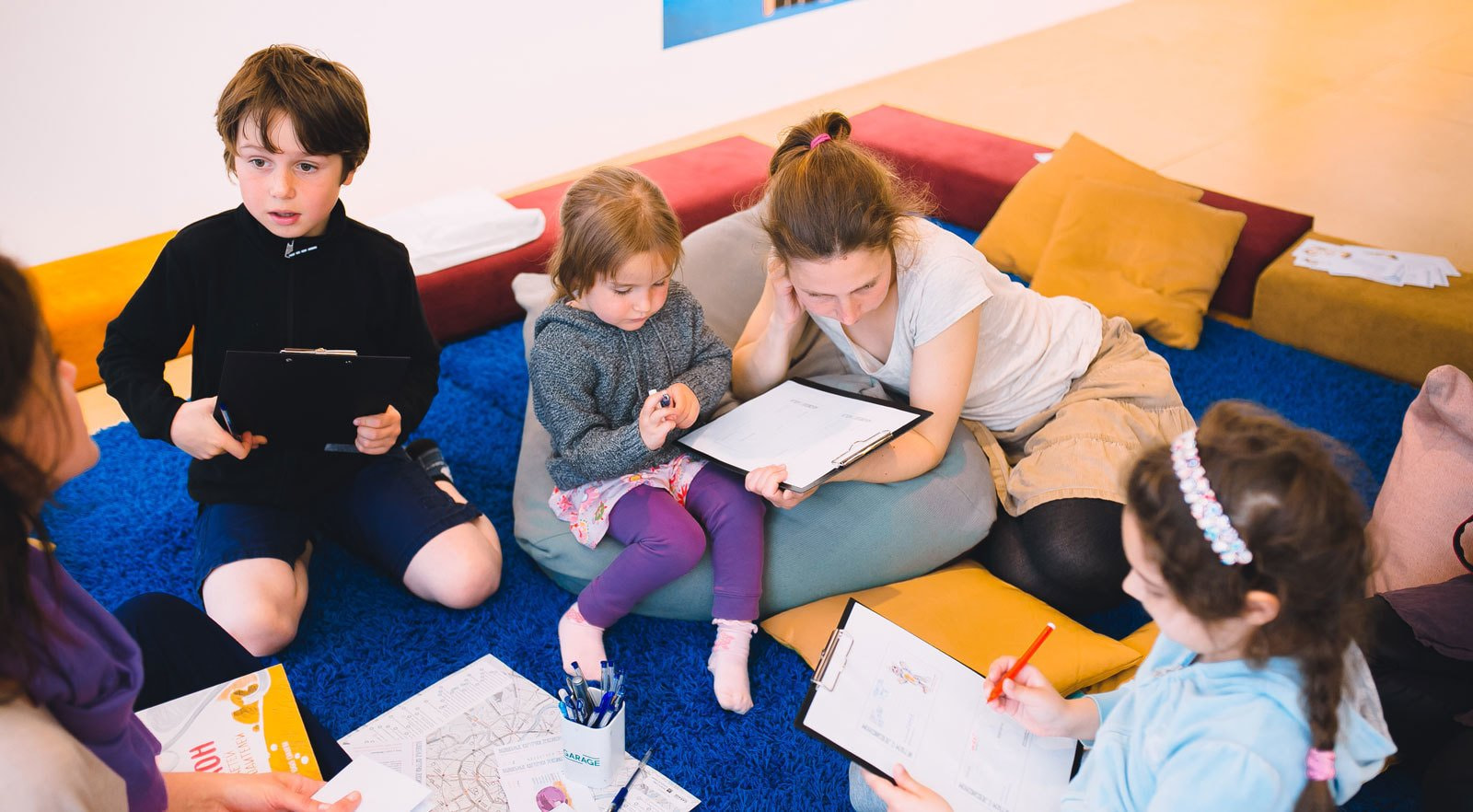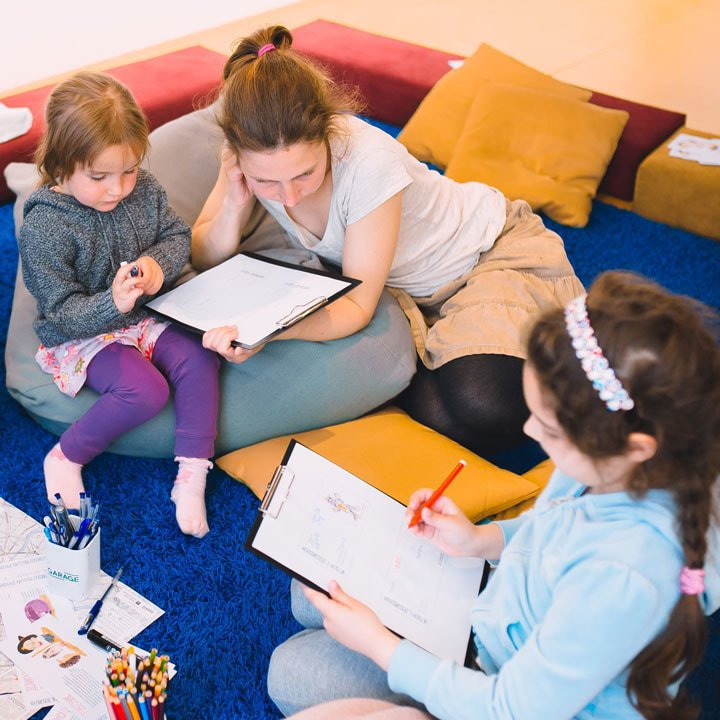Family Days are a great opportunity for children and adults to have fun and learn in a museum. The weekend event features hands-on activities, lectures and exciting tours of current exhibitions.
Family Days at Garage
Date
Schedule
Place


HOW TO TAKE PART
Free admission with online registration.
Accessible for visitors with disabilities.
We also invite deaf and hard of hearing children to attend the workshop, where there will be teachers trained in Russian Sign Language.
Schedule
Workshop: A Constructivist bureau
The workshop members will learn the laws of color perception, investigate structure and other specific qualities of various materials, and create their own architectural models using an unusual building kit.
A lecture and workshop: Functionality? Strength? Beauty?
During the lecture the young listeners will learn more about the Bauhaus school, where students together with teachers reinvented the world around—from forks and spoons to chairs and houses. Rejecting the outdated beauty canons, their novel approach to style meant searching for aesthetic excellence in simplicity and functionality. The participants will get introduced with the principles developed at Bauhaus and still relevant today, producing a significant impact on modern industrial design.
Each participant of the workshop will have the chance to create their own architectural model of a bridge, using the knowledge about the Bauhaus methods and aesthetics acquired during the lecture.
A game excursion around Damián Ortega’s installation The Modern Garden
The young visitors will get acquainted with a garden of abstract sculptures created by the Mexican artist. They will set on a playful investigation around the garden, where, in order to cope with the quest, the participants will have to stay smart and concentrated: the program includes studying drawings, learning what kind of constructions can be made from flat images, find the corresponding sculptures, and arrange all objects in accordance with their places on the plan.
Subject to weather conditions, part of the class may take place on Garage Square in front of the Museum. Please do not hand over children’s outerwear to the wardrobe in this case.
Meet at the Information point 10 minutes prior to the start of the tour.
Family auditorium: Languages and signs
This session available to all audience is dedicated to the various types of data transfer: from beacons and cave drawings to letters, notes and pictograms.
A guided tour of the Anri Sala installation The last resort
The participants will view a sound installation created by the artist Anri Sala, immerse in the music of Mozart, and learn stories about seafarers who traveled to far off lands and the colonization of new territories.
Meet at Garage Kid’s Room 10 minutes prior to the start of the tour.
Open workshop: The sound sculptor
The workshop’s young participants will find out the difference between noise and music, explore the ability of sound to change our perception of images, and will learn to transform sounds into sculptures.
Stories in a museum
The young visitors will listen to legends and fairy tales featuring clothing items as main protagonists.
Family Auditorium: Greet them by their clothes: What can costumes tell about people
How do we choose what to wear? Why does a particular outfit look esthetically pleasing, while the other, not? The lecture will explain what makes clothes iconic, beautiful and fashionable.
Guided tour of the exhibition The Fabric of Felicity
Meet at Garage Auditorium 10 minutes prior to the start of the tour
Open workshop: Princesses and Superheroes 5+
During this practical workshop, the participants will investigate universal “fashion codes” of princesses, villains and superheroes by examining the nuances that have become leitmotifs of their costumes. Having learnt some basics of theory, they will have to choose a character and create an outfit portfolio for them.
Family auditorium: How Duchamp has fooled everyone, or Who Is the Most Important Figure in Art
The audience will learn how and why in the twentieth century, museums and galleries began exhibiting extremely bizarre things, such as a bicycle wheel, mussels, and eggshells; who decides which objects should be regarded artworks; and how they get into museums and exhibitions.
Tour of the exhibition Marcel Broodthaers. Poetry and Images
The group will visit the exhibition of the Belgian poet and artist Marcel Broodthaers, will get acquainted with his works, learn about his life and practice, while the guide will explain the importance of Broodthaers for the history of contemporary art.
Meet at Garage Kids’ Studio 10 minutes prior to the start
Open workshop: Verbal drawings or texts made of objects
Museum educators will ask the participants to experiment with imagination by playing with words and images, and to think about things that can be made using only verbal, or, contrarily, only visual and three-dimensional mediums. Workshop members will have the chance to draw a painting using words, create their own mini spectacles in an empty box without objects, or write a wordless poem.
Tour of the exhibition The Fabric of Felicity with a game guide
Garage’s young visitors will explore complicated and important topics raised by artists in their works currently on show at the Museum. The subjects will include the role of clothing in human life, our personal selection of styles and outfits, production of clothes, and stories they can tell about their owners. Guided by the Museum’s teachers, the participants will perform exercises from a special children’s exhibition guide, designed in a game format.
Meet at Garage Kids’ Studio 10 minutes prior to the start
Family auditorium: Fabric, thread, and yarn and in European and Asian myths and legends
The lecture will focus on fairy tales where clothing items lead to magical transformations, as well as any folklore characters who spin, weave, or sew in order to measure time, save protagonists, or even conceive histories and entire worlds.
Tour of the exhibition The Fabric of Felicity
The group will be introduced with the works on display executed by artists from different countries who use fabric and clothes in their practice to symbolically represent current and past events.
Meet at Garage Kids’ Studio 10 minutes prior to the start
Open workshop: The art of weaving
The workshop members will learn about the tradition of handmade weaving and its diverse techniques, before creating their own artworks using fabric, a special desktop machine, and weaving technology.
A complex family quest around the exhibition Marcel Broodthaers. Poetry and Images
Completing tests included in this quest around the show Marcel Broodthaers. Poetry and Images will allow children and parents to get a better idea of the famous Belgian artist’s life and practice. Concluding the session, the participants will compose a visual storyline using the answers to the quest, and an artwork using text.
Family auditorium: Shifting clothes carnival
The audience will get acquainted with various carnival traditions and costumes of different countries, while also learning when fancy-dress parties emerged as a format and how the genre of carnival evolved over time.
About the lecturer
Elena Eliseeva is an art historian, teacher of art and fashion history. Author of the Laboratory of Style program at the All-Russian Museum of Decorative, Applied and Folk Arts (2016–2018, Moscow); invited lecturer (History of Fashion) at the private British school Ila Aspect (St. Petersburg); author and presenter of many public cultural and educational programs.
Open workshop for the entire family
Inspired by international carnival traditions, participants of this workshop will experiment with the most diverse materials and techniques before creating their own new-year outfits.
Poster Workshop accompanying the exhibition The Fabric of Felicity
On the last day of the exhibition The Fabric of Felicity the Museum’s educators want to encourage families to get inspiration from the works on display and create their own posters. After selecting a particular piece during a tour through the show, the participants will pen and sketch their impressions of it—before carrying out a detailed analysis of their ideas and materializing them in a poster, using, for instance, the medium of a fabric and paper collage.
All of the final works can be taken home or left as gifts to Garage.
Free admission with advance registration (registering only one child is enough)
The sessions begin every 40 minutes
The event is accessible to deaf and hard of hearing children, there will be teachers trained in Russian Sign Language.
Open workshop for the entire family
Family Day participants will learn more about Garage Museum of Contemporary Art by exploring its environment and getting acquainted with the staff, before creating portraits of Garage visitors.
The Museum is much more than just an exhibition venue. It has a library, a bookshop, an auditorium, a kids’ studio, a café, and even a cinema. But what makes it a museum above all are its visitors and staff.
The participants of Family Day will have the chance to learn more about Garage and become sociological researchers for one day while creating portraits of the Museum’s visitors. These portraits will help to reveal who attends museums and exhibitions and why. Concluding the session, the participants will display their drawings in the scale model of the Museum.
The event is accessible to deaf and hard of hearing children, there will be educators trained in sign language.
Open workshop for the entire family
The space of Garage’s Kids’ Studio will transform into an exhibition making lab.
This workshop encourages every child to become an artist, curator, architect, designer, or even an exhibition installer for a few hours. Garage educators will clarify all aspects of these museum professions and help the group to prepare their own show collectively: the participants will have to create artworks (paintings, sculptures, and installations) based around a selected subject, come up with the exhibition title and write a preview, hang or install the items, design a promo poster for the event and finally, open it.
The event is accessible to deaf and hard of hearing children, there will be educators trained in sign language.